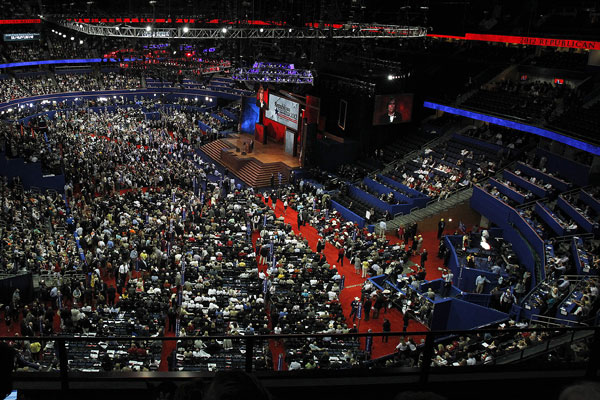Delegates have known for months (or longer) whom their parties will nominate for President. With such predictability, the national conventions have been taken for granted, and a few myths have arisen.
Chief among these myths is that conventions no longer matter. As AP managing editor Michael Oreskes puts it, they’re “the largest, most expensive infomercials in human experience.”
In reality, national political conventions are vital to both the political parties and the American people.
The national convention allows each party to frame the election. It’s the occasion for releasing the national party platform, which spells out the central philosophical theme and key policy positions on which the candidates run. Moreover, conventions can make or break a party’s chances on Election Day.
For instance, at the 1912 Republican Convention, the party leadership chose the constitutional conservatism of incumbent William Howard Taft over the radical constitutional reform of Teddy Roosevelt. Taft won the nomination but lost the general election to Democrat Woodrow Wilson.
Barry Goldwater’s defiant 1964 acceptance speech, in which he declared that “extremism in the defense of liberty is no vice,” galvanized the right but allowed liberals to tie the albatross of extremism around conservatives for years.
In 1968, Hubert Humphrey’s warm embrace of President Lyndon B. Johnson’s Vietnam policy—combined with the complete mismanagement of the convention’s protests—sealed Richard Nixon’s victory. Humphrey’s last-minute surge, propelled by organized labor, couldn’t dig him out of the hole of the Chicago convention.
Conventions also matter to the average American voters, many of whom are beginning to pay attention to the race for the first time. Conventions present to the American electorate, in prime time, the nominees of each major party. It’s a chance for the candidates to shine or be melted by the spotlight.
In 2008, America met Sarah Palin, John McCain’s vice presidential candidate. Palin’s speech electrified the convention, energized the Republican Party, and gave the ticket a bump in the polls. People forget that McCain led Barack Obama by a couple of points just before the financial crisis erupted.
And let’s not forget that the conventions matter to the ratings-starved mass media. Conventions are like the summer Olympics—there’s nothing else to watch but reruns of NCIS and Everybody Loves Raymond. The conventions offer a pre-packaged, easy to follow format in an enclosed space.
Yet the most important speech you’ll hear may not be the one the media hypes. Ronald Reagan’s spontaneous remarks at the 1976 Republican convention, looking forward to America in the year 2076, caused delegates to wonder whether they had nominated the right man in Gerald Ford. Obama’s moving keynote address in 2004 overshadowed John Kerry’s acceptance speech, introduced the state Senator to a national audience, and prepared the way for him to win the presidential nomination four years later.
Political conventions have been a part of the American political process since the 1800s. For die-hard politicos, conventions are “the seventh-inning stretches of presidential politics, a pause to consider the interminable prelude and the coming climax,” as George Will put it. For the rest of America, they are the opening kickoff of the presidential campaign. They offer a chance to meet the candidates and find out the party’s message.
Elections, after all, are about choices. And Americans have a choice to make—none greater than this year, when America is at a crossroads.































